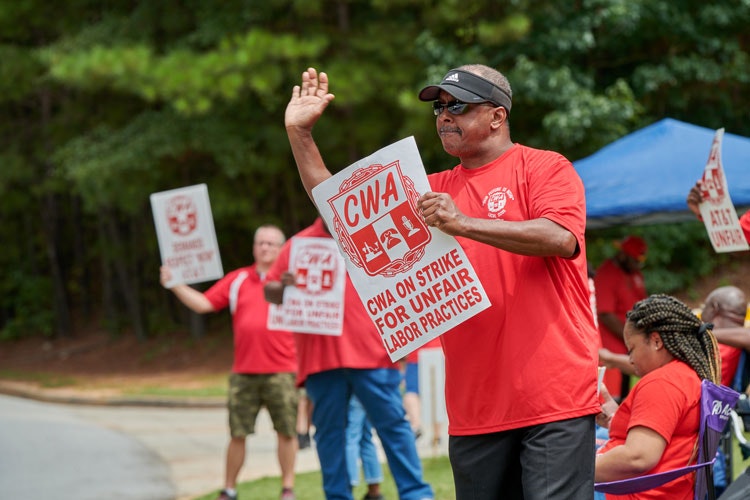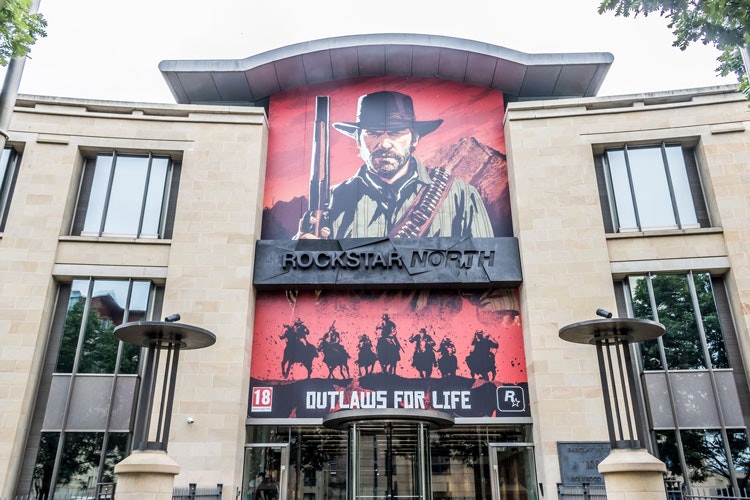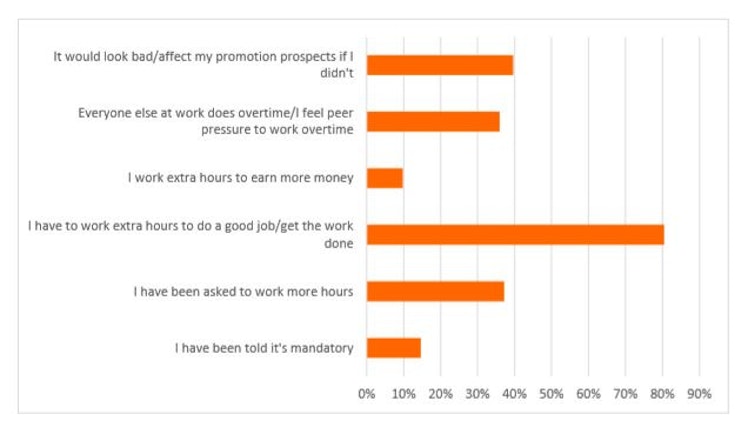They’re professions that by default require some of the most high-tech equipment and in-depth coding knowledge there is, but workers in the gaming and tech industries (“digital employees”) of the US are calling time on antiquated working practices.
The drive for digital employees to unionise has been ongoing for some time in the US. It has periodically been bolstered by newsworthy scandals, such as Google’s firing of the “Thanksgiving Four” for their participation in coralling employees back in November, or the firing of 800 Activision Blizzard workers despite a record-breaking year of revenue, last February.
Now, digital employees looking to unionise have a considerably bigger teammate in their corner: The Communications Workers of America (CWA). Traditionally the trade union of telecommunications and IT workers, the organisation has launched the Campaign to Organize Digital Employees (CODE), a call to arms for game and tech industry workers to reject poor working cultures and practices.

“Companies are failing to live up to their stated values”
In a statement, the CWA names “sexual assault and harassment, ageism, unequal pay, ‘crunch time’ (long-term overtime and overworking), poor treatment of contract workers, inadequate racial and gender diversity, and lack of transparency and inclusion in decision-making around controversial contracts with the U.S. Department of Defense and Immigration and Customs Enforcement (ICE)”, as issues at the forefront of the struggle.
It all amounts, according to the CWA, to a disconnect between what companies’ say about their working cultures, and what the reality is. Lead organiser for CODE, Emma Kinema, explains to Design Week: “Many workers are drawn to particular companies by their stated values and the positive impact they want to leave on the world with their work, but later come to find out the company is deviating and failing to live up to those values.”
Negative working practices are largely normalised, says Kinema, and in many companies there are vast differences between workers’ wages. “There is a mass prevalence of often misclassified and poorly treated contract labour being used,” she says.
“Effectively, [this creates] rifts between workers and keeps everyone’s conditions lower. While some workers are paid well, there are also many workers making poverty line wages, often in cities that are incredibly expensive to live in.”

Worldwide tensions
This latest move forms part of a longer history of unionising calls. Kinema points to the WashTech union that fought – and won – a number of labour fights against Microsoft throughout the 1990s as evidence for tensions having bubbled under the surface for some time.
But by no means is this just a US issue. In France, Le Syndicat des Travailleurs et Travailleuses du Jeu Vidéo (STJV) has led a number of strikes over games developers’ low pay, pension concerns and firings, including a seven-week walkout of workers at Eugen Systems in 2018.
In Brazil, Infoproletários has been organising tech workers since 2017 in a bid to fight abusive working practices in the industry and better support workers. So far, the group has done this through education workshops and worker support.
In China, the anonymous 996.ICU project, laid bare the growing upset of tech workers, referring to the “996” culture – workdays from 9am to 9pm, six days a week. Sharing examples of excessive overtime and ranking the worst offenders, the project was followed on Microsoft’s code hosting platform GitHub by more than 176,000 users.
And in the UK, there’s no shortage of similar tensions. Most recently, multi-award winning studio Ustwo was accused of union busting, while Rockstar North was accused of making their developers work 100-hour weeks in the run up to the release of Red Dead Redemption 2 in 2018.

“The ‘crunch’ is burning out the staff”
Philippa Childs, head of UK-based creative industry trade union Bectu, a sector within the wider Prospect organisation, says the similarities in precarious working conditions worldwide are a symptom of an industry in its infancy. “The video games industry is relatively young and is experiencing many of the same issues that other newer sectors are going through.
“Games workers love their jobs but as the industry matures it needs to adapt in order to retain key staff as they are no longer able or willing to work in the same way they have previously.”
Last year, Bectu released figures from its survey of working conditions in the UK’s games industry. Reacting to the 57% of workers who regularly work overtime, and the 53% who feel their work/life balance has been negatively affected, Childs says: “It’s clear the infamous ‘crunch’ working model is burning out the staff who are the bedrock of the industry.”
Childs notes there is a “growing” interest for unionisation among UK tech and games workers, pointing to Bectu’s own rising membership in the industry, but that anti-union hostility can still be felt. Calling it “disappointing”, she urges workers to join en masse with their colleagues so that they might acquire the power necessary to evoke change.

Different forces at work
As the situation in the US progresses, there are a number of forces acting on the UK’s gaming and tech industry workers. CEO of the Association for UK Interactive Entertainment (Ukie) Dr Jo Twist says Brexit has the potential to destabilise matters further.
With EU workers potentially being discouraged from working, or applying to work, within the UK industry, Twist says the workforce will suffer. “It’s essential that the sector prioritises diversity and inclusivity in the coming years,” she says.
Think tank Policy Connect’s design and innovation specialist Jack Tindale points to further external factors affecting freelancers and designers working for studios. “Small organisations will want better guarantees from the government – things like cracking down on late payments and invoices, or R&D tax credits.
“While there needs to be focus on labour and employment rights for workers in bigger established studios and organisations, there also needs to be focus on how we might make life easier for indie designers too.”
Adapting to “the priorities and objectives of the workforce”
Many of the issues facing game and tech workers are also felt by designers in the wider industry. Back in 2010, Design Week polled its readership asking if the industry needed a trade union, with an overwhelming 70% in favour.
A number of trade unions have launched or maintained offshoot groups dedicated to designers since then, including the United Voices of the World’s Culture & Design and Unite’s Graphical, Paper, Media & Information Technology branches as well as Prospect’s Bectu. But as it stands, no one dedicated trade union acts as an umbrella for the entire industry.
Whether or not the industry needs one, Kinema says any journey toward a unionised workforce could be a long one. “It goes company by company,” she says, adding that “as more workforces [unionise]…we’ll see broad improvements to the wages and conditions.”
Childs echoes this, saying that for each sector of the wider design community, a union would be there to act according to “the priorities and objectives of the workforce”.
“Whether it is in negotiating a new overtime policy, putting in place a more robust system for tackling bullying, helping to put in place a transparent pay and reward system to eliminate equal pay issues, or offering training and development opportunities, we help workers in every part of the economy to get more out of their working life,” she ends.

- Design disciplines in this article
- Industries in this article
- Brands in this article










2 responses to “Unionising game and tech workers: should the UK follow the US’ lead?”
I can tell you something about unionisation within the UK design industry from personal experience. In the mid-1970’s in my early 20’s I worked at a design studio which sent artwork to printers on board. One day a man walked into the studio without any prior appointment and proceeded to lecture us on the benefits of joining his union which was called SLADE art. He said that due to the perceived advent of computerisation within the industry (still some way off) we would all be out of our jobs by the age of 40 and in any case we were now required to join the union in order for our artwork to go to print. After he left, my company under threat of being unable to print asked for volunteers to join the union which I did for a subscription cost of something like £2.50 for which I received a membership card and the company gained a stamp that they could endorse the back of all our artworks. I was the only one who joined since membership was not necessary for all employees. This situation last two years before being quietly forgotten. Forty odd years later I am still working in the industry and the word union has never been mentioned at any other company I have worked for. I wonder if this is an issue for freelancers? and what difference it would make today.
There was a period in the seventies when unions used some pretty nasty tactics – for example, saying they’d refuse to work with anyone who wasn’t in a union as well. If you think about it, it’s about as ethical as banning unions – it’s a way of using force, and the stronger the union, the more it happened as they tried to leverage their power.
A fascinating period, and it’s what led up to Thatcher – in their greed for power and money they sowed the seeds of their own destruction. It wasn’t necessary to go that, but I can also see why they tried as workers were often treated appallingly back then. Too many still are today, and the creative industries do struggle sometimes with juniors getting very little and some seniors/large agencies getting quite astonishing amounts of money.